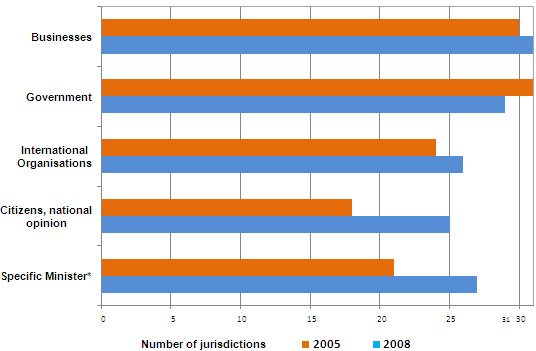Politique réglementaire
Countries should focus on the quality of regulations for a sustainable recovery, says OECD
OECD countries have made major progress in cutting red tape for citizens and business over the past decade, putting in place more transparent and better regulations. But the pace and depth of reform varies widely between countries. Improved regulations will play a key part in a sustainable economic recovery. The report Indicators of Regulatory Management Systems offers insights into trends in regulatory reform and underlines the importance of having the tools in place to measure progress.
OECD Indicators of Regulatory Management Systems compare the regulatory policies, tools and strategies of the 30 OECD member countries and the European Union. The results show that citizens are now a driving force behind regulatory reform efforts, along with businesses. Ministers are also increasingly committed to the reform process: 27 countries had a specific Minister accountable for promoting regulatory reform in 2008, compared with less than half of OECD countries in 1998.
Drivers for reform, 2005-08

* Specific Minister accountable for promoting government-wide progress on regulatory reform.
Source: "OECD Regulatory Management Systems’ Indicators Survey", www.oecd.org/regreform/indicators.
Increasingly, the regulatory management systems of countries give attention to the quality of new regulatory proposals. But most countries continue to face challenges in implementing good practices – in particular ensuring the transparency of the processes for making new regulation, open consultation practices and a rigorous assessment of the costs and benefits of planned regulations. The OECD recommends investing in better training and the provision of guidance for public officials to improve long term results.
More countries should fully integrate the assessment of regulatory impacts into the policy process: with OECD economies under pressure, it is important to understand the cost and benefits of regulation, and the costs of implementation in advance to ensure the expected benefits can be achieved at minimum costs. The report recommends governments to improve their communication with citizens and businesses, in order to better understand their needs and concerns.
The report finds that:
- Some countries are more focused on the improvement of new regulations, such as Australia, Canada, New Zealand, the UK and the US, while others tend to give greater priority to the reduction of administrative burdens from existing regulations, as is the case for example for Germany, the Netherlands, Mexico and Sweden.
- OECD members reporting significant reforms to their approach to regulation over the past three years, include the Czech Republic, France, Germany, Japan and the EU Commission. It may take time for the benefits of these reforms to materialise.
- Most countries now report having adopted Regulatory Impact Analysis, to assess the impact of new regulations. However, less than half of the OECD countries systematically required quantification of the corresponding costs and benefits of new regulatory proposals.
- Programmes to improve regulatory policy settings are still in an initial phase in some countries. This was the case for example in Hungary, Iceland, Luxembourg, Portugal, the Slovak Republic and Turkey.
The indicators are based on surveys completed by officials in 1998, 2005 and 2008 for the national governments of OECD member countries and the European Commission. The results are complementary to the detailed country reviews carried out within the OECD's regulatory reform programme, which take into account the specific context of the country concerned and analyse the implementation and effectiveness of regulatory management practices.
Full 2009 report: Indicators of Regulatory Management Systems
Policy Brief: Improving the quality of regulations.
For more information on OECD’s Indicators of Regulatory Management Systems, please contact: Christiane.Arndt@oecd.org, Gregory.Bounds@oecd.org, or Helge.Schroeder@oecd.org in the Regulatory Policy Division. Visit oecd.org/regreform.
Documents connexes